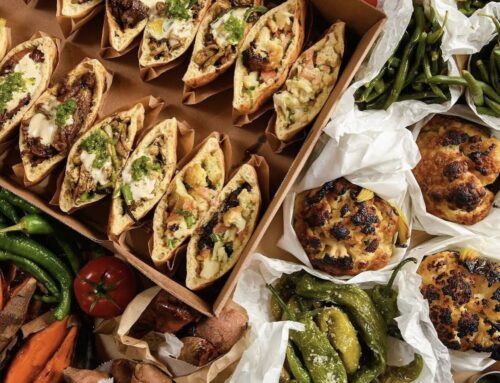In mid-September, Junius Heights residents David and Kate Meis went to the doctor for Kate’s sonogram. She was about seven and a-half weeks pregnant at the time, and, after taking fertility treatments, the Meises were happily expecting twins.
Two years earlier, because of Kate’s PCOS (polycystic ovarian syndrome), which can cause infertility, the Meises had used fertility treatments to have their son, Ben. This time around, they were told they had two mature follicles.
There were some smaller ones, but we had smaller ones with Ben, too,” Kate says, adding: “We were excited, thinking, ‘We’ve got three kids now. This is great!’”
The Meises couldn’t have prepared themselves for the news that was coming. The technician performing the sonogram found two embryos, and kept counting.
Six embryos for certain, they were told … possibly seven.
“The sonogram technician — you could tell from her face,” Kate says. “She was pretty shocked. She said in all the years she’s worked there, she’s never counted more than five.”
The couple’s reaction?
“Pretty upset, pretty immediately,” Kate says. “I mean, that’s just not good.”
Adds David, with none of Kate’s penchant for understatement, “Absolute panic and fear. I just kind of covered my face, and I was glad I was sitting down.”
A follow-up ultrasound later confirmed six, not seven, heartbeats (another ultrasound in November revealed three boys and three girls). The couple was given the option of reduction, meaning they could have chosen to destroy some of the embryos.
“We’d discussed it [before the fertility treatments], and we knew we weren’t going to reduce,” Kate says. “I know people do, and it’s a hard decision to make. It’s pretty horrible. You go in at 12 weeks for a sonogram, and you see heads and legs, and there are heartbeats — it just gets more impossible as time goes on.
“Of course,” she says of that early decision, “we weren’t thinking six.”
In the last few months, they’ve had time to become somewhat more used to the idea.
“Most days, I’m all right,” Kate says, “but I still have days when I freak out.”
“I’m taking life two weeks at a time,” says David, referring to Kate’s bi-weekly visits to her OB-GYN and a perinatologist. “That’s as far as we can really see into the future.”
Kate has found it helps to arm herself with information. She surfs the Web and visits forums where other moms of multiples post messages.
“I’m just informing myself, reading what I can, doing what I can so that if something happens, I don’t feel too guilty,” she says. “That way, I know I’ve done everything possible to have helped this pregnancy be successful.”
Both the Meises know the chances of having six healthy babies are not good.
“There’s just so many possibilities that could occur,” David says. “There could be none, there could be seven, and there could be anywhere in between. And, even worse, any of those possibilities could occur, and then there could be complications, and I would be without Kate.”
Single-birth pregnancies have a gestational period of 37-40 weeks, and the longest recorded sextuplet pregnancy was 32 weeks. Kate’s doctors want her to get to 28 weeks — early February — and soon she’ll likely be on round-the-clock bed rest.
“The longer I can hold them in the better,” she says. “But we’ve been told this probably won’t end well.”
Still, the Meises remain hopeful, though even hoping to bring home six healthy children, they admit, can sometimes set them reeling emotionally.
“We found ourselves — in the very first few hours after we found out — it was a time of both joy and of heartbreak and sadness,” David says. “We found our laughing and crying in the same moment.”
And there are logistical considerations — space, money, time — to figure out. The Meises have an upstairs room they plan to extend over the back of their house, making it into a large nursery for all the babies.
And job wise, they should be OK, too, says David, an architect.
“The good thing is my time is flexible in what I do and the relationship I’ve established in the firm.”
But the money, he admits, scares him.
“It’s a challenge, and I haven’t completely figured out how we’re going to do that.”
But there have been offers of help already (see sidebar, page XX), and likely more will pour in as they get closer to delivery and after the babies are born. One of David’s cousins, a golf pro, already has offered to organize a charity golf tournament, and another cousin has offered help “in any way she can.”
“I’m glad to hear that and know those offers are out there,” David says.
And then there are matters of how many people it takes to physically handle multiple infants.
“We do know that we’re going to need a lot of help, with people staying over, taking shifts, rocking babies, feeding babies. We have four hands, but that doesn’t feed six babies,” he says, laughing and adding, “and it doesn’t comfort six babies.”
While they ponder such difficulties, they also wait and prepare for the inevitable media onslaught.
“That’s one of the first things I said when we found out,” says Kate, an admittedly private person. “I was crying, looking at my husband, saying, ‘I’m going to be on the news. I don’t want to be on the news.’”
It’s one reason, she says, she’s glad she lives in our neighborhood.
“I’ve heard of people with multiples moving to small towns to escape the attention, but I’m kind of hoping living in this neighborhood, that we won’t be such a spectacle.
“It’s really kind of a smaller community in the grander scheme of Dallas,” she says. “I’m hoping that will help a little bit.”





